#just a regular gal * . ✦ . ˚ (the countess herself)
Explore tagged Tumblr posts
Text
BOLD all that applies to your muse!
Eyes: Blue | Green | Brown | Hazel | Grey | Other Hair: Blonde | Brown | Black | Red | Ginger | Grey/White | Multi-color | Other Body Type: Skinny | Slender | Slim | Built | Curvy | Athletic | Muscular Skin: Pale | Light | Fair | Freckled | Tan | Olive | Medium | Dark | Discolored Gender: Male | Female | Trans | Cis | No Gender | Other Sexuality: Heterosexual | Homosexual | Bisexual | Pansexual | Asexual | Demisexual | Other Species: Human | Undead/Vampire | Shapeshifter (Weres) | Demon | Angel | Witch/Wizard/Sorcerer | Incubus/Succubus | Other Education: High School | College | University | Higher Education Living Situation: Lives alone | Lives with parents/guardian | Lives with significant other | Lives with a friend | Drifter | Homeless Parents/Guardian: Mom | Dad | Adoptive | Foster | Grandparents | Family friend Relationship: Single | Crushing | Dating | Engaged | Married | Separated | It's complicated I've been: In Love | Hurt | Sick | Abused I have a(n): Learning Disorder | Personality Disorder | Mental Disorder | Anxiety Disorder | Eating Disorder | Substance-related Disorder Things I've done before: Drank alcohol | Smoked | Done drugs | Stolen | Self harmed | Starved myself | Had sex | Had a threesome | Gotten into a fist fight | Gone to the hospital | Gone to jail | Used a fake ID | Gone to a rave | Killed someone Positive Traits: Affectionate | Adventurous | Athletic | Brave | Careful | Charming | Confident | Creative | Determined | Fearless | Generous | Honest | Humorous | Intelligent | Loyal | Modest | Patient | Selfless Negative Traits: Aggressive | Bossy | Cynical | Envious | Fearful | Greedy | Gullible | Jealous | Impatient | Impulsive | Insecure | Irresponsible | Possessive | Sarcastic | Self-conscious | Selfish | Unstable
#you know i never drink wine * . ✦ . ˚ (headcanons)#just a regular gal * . ✦ . ˚ (the countess herself)#the munsters rp
0 notes
Text
So the thing about vampires is that they’re not actually aristocrats. They pretend to be aristocrats, but they’re interlopers, putting on a façade of nobility so they can infiltrate high society. The disguise makes them trusted, respectable, above reproach, but it was always a lie. There is no nobility in the monstrous dead.
Carmilla by Sheridan Le Fanu was published in 1872, 25 years before Dracula. The titular character passes herself off as a young noblewoman in dire straits, so she’s taken in as a guest by an aging widower and his teenage daughter, Laura, who live alone and isolated in a castle in the wilds of Austria. (Alone except for the servants, of course, and isolated except for the nearby village, but everyone knows people don’t count as company if they’re below a certain social class and/or not English.) Carmilla is strange, intense, prone to bouts of melancholy and brief bursts of passionate anger, and will say nothing about her family or her past. Laura has multiple eerie dreams about her. They of course become close friends. Pals, one might even say. Just gals being pals.
Young women in the nearby village start dying, Laura contracts a mysterious illness, Laura keeps dreaming that a panther comes into her room at night and bites her on the breast before turning into a woman and disappearing, etc. Obviously Carmilla is a vampire. Carmilla is also an anagram of Mircalla, a countess from nearly 200 years before. Carmilla really likes anagrams, it turns out, and regularly goes around seducing young women to death under anagrammed pseudonyms.
And look I realize that Carmilla actually being a long-dead countess seems to contradict the whole “not really nobility” thing, but Carmilla's not a countess anymore in the same way Lucy’s not herself anymore after a certain point. That countess is dead. Carmilla is the thing that wears her skin.
Anyway all of this is because I’ve decided to catch up on Dracula Daily by listening to the podcast (phenomenal sound design btw), and I just finished May 5, where we have this little description:
Hitherto I had noticed the backs of his hands as they lay on his knees in the firelight, and they had seemed rather white and fine; but seeing them now close to me, I could not but notice that they were rather coarse—broad, with squat fingers.
Dracula seems to have fine, pale hands, the hands of an aristocrat, but on closer inspection they’re not fine at all. The façade doesn’t hold up to true scrutiny.
But of course it goes further than that, because he’s not just a regular man pretending to be a count. A regular man doesn’t have hairs growing in the center of his palm. A regular man doesn’t have nails filed to a sharp point. He’s not a man at all.
— disclaimer that actually some people DO have hairy palms, it’s a form of localized hypertrichosis (aka hair in unexpected places) and it’s not at all common, but it is perfectly normal in the same way that lots of weird body stuff is perfectly normal. human bodies get up to some wild shit! “average person with hairy palms is a monstrous creature of the night” actually a statistical error; Vlad Dracula, the most famous haver of hairy palms in all literature, is an exception adn should not have been count.
#dracula daily#absolutely loving the podcast#they did a great job with it#dracula meta#finx reads dracula
37 notes
·
View notes
Text
INGMAR BERGMAN’S ‘SMILES OF A SUMMER NIGHT “If people only knew how unhealthy it is to pay attention to what people say, they wouldn’t bother to listen and they’d feel so much better…”
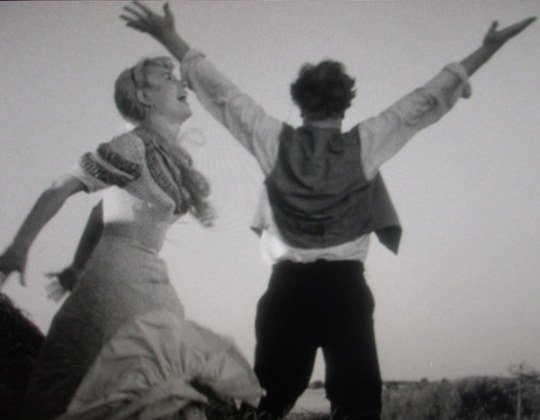
© 2019 by James Clark
Like the Bergman film, Winter Light (1963), Smiles of a Summer Night (1955), threatens, at first blush, to be a pain in the ass. Instead of the former film’s protagonist’s death march through rootless theology, we have a veritable general assembly of gluttons for winning advantage over everyone else, so smug and fatuous in their ridiculous “sophistication” as to seem not only from several centuries past but obviously headed for embarrassment. However, just as we were rewarded by putting up with the first hour-plus in the first-mentioned film, there is, in the latter (our film today), after quite a long while, something delicious turning the tables—which is not to say, becoming dominant.
At the beginning of the 20th century, a high-profile Stockholm actress, Desiree, presses her mother—an elderly dowager—to stage a summer weekend for a number of her associates, in order to create a fracas that will wrest away from his very young wife a lawyer whom, as once before, she finds herself in love with. Whereas the jockeying amidst various cynical patricians is hectic and not particularly witty—one scene recalling the Three Stooges—(making for Bergman a much-needed state of solvency and continued career), it is the non-amorous octogenarian who makes the occasion truly sexy.
There is a prelude to this romp, where Desiree bursts into her mother’s bedroom (interrupting the latter’s game of Solitaire, at 7 a.m.) to have her write out the invitations. While the daughter drinks a lot of coffee and then skims over a novel, the owner of the estate has more to say about the state of the nation than the progressions of her flakey daughter. On Desiree’s describing her event as doing a “good deed,” the rather frail but very alert intruded-upon declares, “They [good deeds] cost far too much” (the recipient not likely to seriously respond, leaving the donor nonplussed). She goes on to elaborate upon her being fond of Solitaire. The social convener/ daughter asks, “Is anything really important to you?” Her mother, not needing to think it over, shoots back, “I am tired of people. But that doesn’t stop me loving them… I could have had them stuffed and hanging in long rows, any number of them [fine as a decorative possibility; disastrous as actuality]. One can never protect a human being from any kind of suffering [the level of grotesque perversity being like a self-satisfied plague]. That is what makes one so tremendously weary…”
The uniqueness of this inflected misanthrope really gets down to business during the opulent dinner on that “big” weekend for Desiree and for several others who might, sometime later, realize it was not as big as it appeared. (One other epigram in the old gal’s bag of tricks that early morning, involved her exclaiming that she had just won at the present game of Solitaire. Immediately, Desiree, being an archive of snotty put-downs, snipes, “One always does if you cheat a little.” In response, her mother digs a little deeper in face of an overrated artiste, about which the discerning dowager had , in the flow of tedium, mentioned, “Desiree, you worry me…” [she being one of those she is “tired of,” and yet “loving.”] Reading her child like a book, concerning the former beau, now back on the griddle, she [somewhat inconsistently] posits, “Your character is far too strong [for him]. You got that from you father.” But that father had, one day, thrown the mom out a window, an anecdote reestablishing the toughest of tough love.] Worrisome and superficially clever as Desiree clearly is in her mother’s eyes, the latter feels compelled, for the hell of it, to enact a pointless riposte about the depths of Solitaire. “You’re wrong, there. Solitaire is the only thing in life that calls for absolute honesty.”)
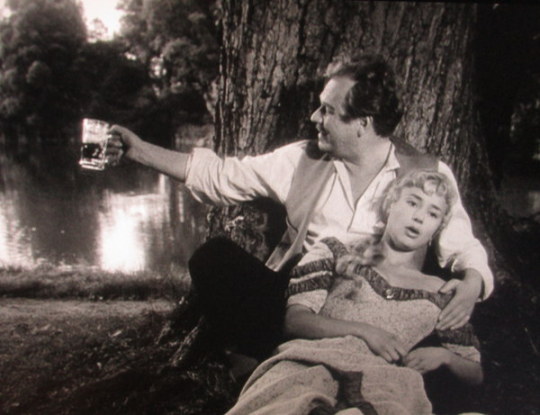
The lady of the house shows, in several ways, that her energies, though having very little to do with those of her guests, have been galvanized to confront here so much of what she not only endures but also transcends. She has placed all the visitors along one side of the long banquet table, the better to set in relief her own distinctiveness, being a constant endeavor, even when, as often, she is alone. We see her in close-up being embraced by many large, blazing and cave-like-emanations of wax. We see her, in fact, as she is, namely, an irregular oracle.
The night commences with a brief glimpse of dark clouds within which the moon darts in and out. Then there are swans in the property’s lake, their consummate gracefulness being some kind of condemnation of the invaders. As you would imagine, Desiree’s contacts, including a count and countess, would dwell upon displaying how much star-power they presume to emit. As seated at the table, their regular diet of concupiscence would be supplemented by the figure of someone seemingly off the lust-grid, and thereby of totally no account. The Countess promptly imagines that advanced conversation could be sustained by the gambit of betting Egerman, Desiree’s designated squeeze, she could seduce him within fifteen minutes. She entitles her thesis, “Can women never be the seducers?” The affluent lawyer in the cross hairs shows some slick lawyering, in terms of, “Men are always the ones seduced.” This brings from the Count, “Nonsense, I have never been seduced. A man is always on the offensive. He [Egerman] just wants to appear interesting.” The lawyer’s student-priest-son takes exception to the tone–“We were brought into the world to love one another…”–only to be met by Desiree, with, “In matters of love we need to be gymnastic,” players of startling range (hold that thought).

Perhaps to forestall the guests throwing buns at each other (she had, on that morning, insisted, “If there are actors [in the guest-list], they’ll have to eat in the stables…”), the adult interrupts, “My dear children and friends…According to legend, this wine is pressed from grapes whose juice gushes out like drops of blood against the pale grape skin. It’s also said that to each cask filled with the wine was added a drop of milk from a young mother’s breast and a drop from a seed from a young stallion. These lend to the wine secret seductive powers. Whoever drinks hereof does so at his own risk and must answer for himself.”
The guests, given their reflexiveness toward packaged self-aggrandizement, convert the lady’s deep poetry to shallow prose (as she knew they would). During the gauche start-up in imagining what heights call for, she trips up the Count, the most besotted of the egotists, by pointing out that if male seduction needs no show of qualities, “your main ally is not your own assets” (but instead an agency you don’t effectively control–the married woman’s marital ennui). At this, the Count, showing some chivalry, calls out, “Bravo!” for her wit. Also at that commencement–of Desiree’s bringing together the virgin, trophy bride (to forestalling Egerman’s getting old) and the virgin moralist, a state which would open the door to the lawyer’s second coming into the actress’ mastery (a step putting randy and now violently boring Count Malcolm back to some semblance of being a husband to a wife who calls herself, “an honest little rattlesnake” and regards love as “a loathsome business”)–the actress advises the callow theologian, beginning to boil over, “Why don’t you try laughing at us?” Perhaps the highwater mark, very brief, of self-criticism, in her entire life.
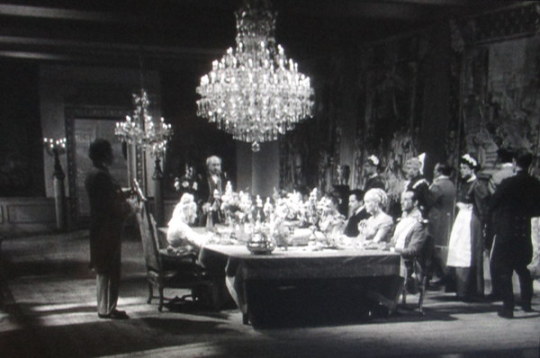
Once the plonk-mavens hit their stride, on failing to do justice to the oracle’s serious vintages, we see no more of her and her wisdom. Whereas, in the later run-through of annoying folks capitulating, in Winter Light, there is a robust, late show of spirit that has a fascinating hope, we have to do without hope here—or at least, very faint hope. It appears that, at this stage of his reflection, Bergman, very intent on savaging those who settle for less, had come to ponder the fate of a dead planet and a special horror and power for those not dead.
How should we make the best of this compromised treasure of a film? As it happens, there’s another wise soul in this catchment of clowns, characteristically hard to find and appreciate. (Many viewers intuit that in Bergman we encounter a giant of modern cinematic mood. But how many realize that he’s a uniquely brilliant writer?) Egerman has brought along his young housemaid, Petra, a good-natured strumpet. She soon links up with, Frid, one of the dowager’s servants; and, with the feast segueing into a multifaceted skirmish, there they are, in the June night, alight with Nordic sunlight, and snuggled down against a windmill, with swans serenely drifting by, she seeming exhausted, and he enjoying another tankard of beer (he having been one of the bearers of that challenging wine). He remarks (almost as if he’d tasted the beverage of choice), “Do you see, Little One? The summer light is smiling.” Petra retorts, “So, you’re a poet, too?” Shaking that off, he continues, “The summer night has three smiles. This is the first, between midnight and dawn, when young lovers open their hearts and loins. Look, then, on the horizon’s smile so soft. You have to be very quiet and watchful to see it all.” Petra repeats, “Young lovers…” Frid teases, “Did that move you, my little pet?” She goes on, with, “Why have I never been a young lover? Can you tell me that?”/ “My dear little girl,” he gently replies, “console yourself. There are few young lovers in this world. You could almost count them. Love has smitten them, both as a gift and a punishment…”/ “And the rest of them?” she asks. “The rest of us? What becomes of us?” With a broad smile, he opines, “We invoke love, call out to it, beg for it and tell lies about it… But we don’t have it… No, my Sugar Pie. We are denied the love of loving. We don’t have the gift… Nor the punishment.”
We’ll never know if this very tenuous associate of the dowager’s could elaborate upon his riveting gambit, because their oracular dialogue is blown away by Egerman’s preachifying son needing their help to procure a horse and coach to effect the beginning of his and Egerman’s wife, Anne, being a constellation of elopement and fatuous denunciation and purity of intent. “Bless me!” Petra exclaims, so thrilled by the “adventuresome”, and yet where not long before, back home, she had been nonplussed by the prig’s reading to her a tract of Martin Luther, “You cannot stop the birds from flying over your head, but you can keep them from nesting in your hair…” Although there was passion that night at the dowager’s, in the aftermath of the dogmatist’s failed attempt at suicide, there was also Anne’s troubling melodramatic approach to the getaway, skulking along the wall of the barn. Right after the precious lovers race beyond the range of inadequacy, there is a cut to a clock at the estate, announcing the hour by a procession of figures, one wracked with care, and another being a skull.
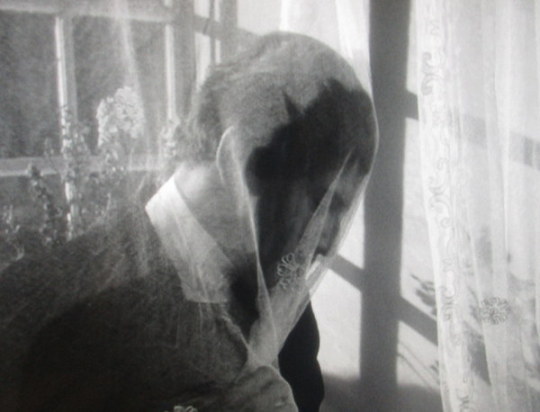
As if to confirm that some can handle excitement far better than others, the apparatus with moving parts, involving Petra and Frid, comprises a coursing windmill, seen in silhouette, perhaps a prelude to clear sailing, along with obscurity. Frid proposes following the second smile of the summer night, “for the jesters, the fools and the incorrigible.” Petra infers, “Then she [the smile] must be smiling at us.” Brushing off his proposal of another beer, she sticks to the gratifying, and unmistakably in play, mysticism. “Then she is smiling at us, I said!”/ “Correct,” is his return to depths he only seldomly tolerates. (That would be Frid’s figuring, in the cinematic reflections of Bergman, at a lesser pitch than and anticipatory of, Jof, the dreamer of acrobatics and impossible juggling, in The Seventh Seal. “Do you want to marry me?” is Petra’s response to something in the stars, spotlighting her affinities to Jof’s wife, Marie, the pragmatic but crazy enough wife of Jof). Frid laughs loudly and with ridicule, at Petra’s impetuousness. Not to be put off by the mixed signals, she argues, “An hour ago you said you wanted to.”/ “That was then,” he claims, being fond of messing around, stemming from a less than sound grasp of a logic of introducing opposites. To that, Petra, knowing that the cat is out of the bag and she wants to bring it home, declares, “You will marry me!”—slugging him a few times for emphasis. Frid tells her, “You’re a strong little sugar plum…” by way of acknowledging that she’s not like other girls. Pummeling him and shooting off that matrimonial threat again, over and over, carries the conflict to a strange thread of resolve. (Here a cut to ponderous Desiree, tucking into bed her child, obviously from Egerman, whom she persists, however, in lieu of mystery, in refusing to specify the roots, such as they were. Her favorite saying, within this “comedy” decidedly veering to farce, is, “Men need to be guided to their own best interests.”) When next we see the hardy servants—after a madcap display of the seduction addicts cementing their power interests and giving no thought to love—they have produced a hybrid of the joys of paradox and the joys of something less than that. “Do you promise to marry me?”/ “Just let go of my ears!” is Frid’s rejoinder. (This moment is shown from a long distance away. The stone-built mill is integral; they’re already dissipating into a rural void. Now in close-up, his own fatalism has bought into something far from unique. “I promise!”/ “Swear by everything you hold sacred!” the hitherto promiscuous loose cannon preaches. “I swear by my manhood”—the context being a mound of straw which he falls back into while shooting erect one of his legs. At this, Petra, triumphs, “Then we can consider ourselves engaged!” She falls back on the straw and her leg shoots skyward. “May Frid rest in peace,” is his take on this irony. “He’s on his way to hell now!” “Up you get, Fatty! Time to groom the horses,” are his marching papers. Having already assimilated a stiff dose of the mundane, while still in the hunt, regardless of the odds, Frid can call out, “There is no better life than this!” To which Petra adds, “And the summer night has smiled for the third time,” in a synthesis.
In this moment of advance and retreat, Frid feels compelled to accentuate the positive. “For the sad and dejected, for the sleepless and lost souls, for the frightened and the lonely…” [we persevere]. Petra adds, “But the clowns will have a cup of coffee in the kitchen!” Their leaving us in a distant shot, as they make their way through a fine grain field is far from the end of their activation. The ironic Hollywood upsweep here in the sound-track poses a threat having been surmounted.
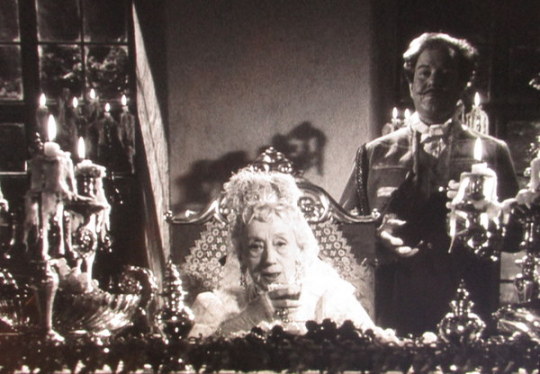
Frid and Petra don’t expect much. But, by comparison with their “betters,” having totally missed the point of the oracle, they send forth the kind of ragged lucidity to be seen more pointedly, two years later, in Jof and Marie, in, The Seventh Seal (1957).
With the child-bride and the child-priest out of the way, there is Desiree, responding to Egerman’s, “Don’t leave me…”: “I make no promises. You’re a terribly boring, normal person, and I’m a great artist.” The Count and Countess have their kind of confluence: He mocks, “I shall be faithful for at least seven eternities of pleasure… eighteen false smiles and fifty-seven tender whisperings. Without meaning. I shall remain faithful until the great yawn do us part. In short, I shall remain faithful in my way… I can never be at ease. You know that.”
Before closing this saga and its trio of fascinating seers, there remains to be noticed explicitly how the work by such a consummate craftsman as Bergman sees fit to hatchet those who trade in facile artistry. Egerman’s being a successful attorney-at-law (acting for another in legal matters) has been exposed as lacking in initiative for the sake of primordial justice. His coquette doll of a new wife, Anne, knows very well about social climbing by way of her looks, and she ends up looking like a saccharin, tasteless. life-long bore. Frederick, the Second, whose discernment in women is on a par with his understanding of cosmic love—his father having kicked himself, about asking the outcome of a battery of his academic exams, with “silly question,” [that it could be anything but Straight-A’s]—would have derived, from his glittering answering at school, being a yes-man in an ivory tower meaning precious nothing. Desiree’s status as a theatre darling in a provincial outpost comes to a moment of pocketing Egerman’s set of photos of princess Anne. Count Malcolm, the dueling and killer croquet expert, shows us his hot wheels (capable of a dazzling 20 mph) while driving, along with the Countess and a servant, into the dowager’s moment of truth. Their get-up and the backfires therein, resemble flatulence, perfect for a Three Stooges accomplishment. In assenting to her husband’s incurable malignancy, the Countess Charlotte defines herself, being a confident of Anne, as another clever materialist. But, with Desiree, watching the Count playing croquet as if a crucial activity, she gets off the slimmest glimmer of contempt for his “unyielding virility,” his addiction to make every move a military gain. Notwithstanding, Desiree, from out of the patented cynicism of her coterie, seeks to smarten up the scholar with the wise proposition, “… sensible adults treat love as if it were a military campaign or a gymnastics exhibition.” Soon we shall treat of an even more incisive instance of this matter of fruitful interplay, in the perhaps greatest of Bergman’s films, The Magician (1958).
0 notes
Text
𝐦𝐮𝐬𝐞 𝐬𝐭𝐚𝐭𝐬 𝐟𝐨𝐫 𝐦𝐨𝐛𝐢𝐥𝐞 :
Basic Information
Full Name: Lily Gruesella Dracula
Nickname(s):
Age: 150 years
Hometown: A small village outside of Cluj-Napoca
Current Location:
Ethnicity: Romanian
Nationality: Transylvanian
Gender: Female
Orientation: Romantically and sexually attracted mainly to men, but admires the beauty of women too.
Religion:
Political Affiliation: Moderate
Occupation: Homemaker, part-time businesswoman.
Living Arrangements: Living in ancestral home with her father and their manservant, Igor.
Language(s) Spoken: Romanian, French, English.
Physical Appearance
Face Claim: Sheri Moon Zombie
Hair Colour: Black with a wide whtie stripe
Eye Colour: Blue
Height: 5'7 '' / 1.78 m
Build: Tall, willowy, slim curves
Tattoos: Tattoo of boyfriend under left shoulder on the back
Piercings: Earlobes
Clothing Style: Romantic, ethereal, regal, feminine. She prefers gauzy gowns with trailing skirts and sheer sleeves, but she will occasionally wear pants; when she does, she adds girlish touches to it, like heeled boots and statement jewelry.
Usual Expression: Otherworldly gaze.
Distinguishing Characteristics: White streak in her, deathly pallor.
Health
Physical Ailments:
Neurological Conditions:
Allergies: Garlic
Sleeping Habits: Sleeps mostly during the day
Eating Habits: Three healthful meals a day of mostly vegetables and the occasional glass of blood.
Exercise Habits: Dancing mostly, or floating around the castle. She enjoys swimming shark-invested beaches and long walks in the cemetery, too.
Emotional Stability: 9. She's very sensible and in control of her emotions but is also sensitive and has a slight temper.
Sociability: Enjoys spending time with others and making new friends, although she also loves a nice quiet night at home with the family.
Body Temperature: Chilling
Personality
Label: The Sweetheart; the Halcyon; the Fashionista.
Positive Traits: Independent, assertive, wise, nurturing.
Negative Traits: Temperamental, too sensitive,domineering, intimidating.
Goals/Desires: To find her soulmate; to live her best life.
Fears: Rejection, abandonment.
Hobbies: Sewing, embroidery, fashion, gardening, parties, modeling, baking, cooking.
Habits: Physical tic of dramatic hand gestures.
Favourites
Weather: Cozy thunderstorms or chilling winter nights
Colour: Pastels (violet, pink, yellow, mint, and bone-white) accented with black.
Music: Florence Welch, Lana del Rey, Stevie Nicks, the Rolling Stones, Siousie Sioux, dirges by Bortok and Stravinksy.
Movies: Cozy horror, romance, occasionally action if it’s well-done. The Haunting is her comfort movie; House of a Thousand Corpses is her favourite comedy (although she does dislike the language).
Sport: Dancing and archery for herself; wrestling and drag racing to watch.
Beverage: Belladonna tea, O negative blood (only once a week, if she needs to take the edge off), and coffee two lumps of sugar.
Food: Ladyfingers, fungus fudge, and other sweets and comfort food; she also enjoys Mediterranean and Middle Eastern food, and has become a vegan.
Animal: Cats, spiders, rats, bats, and dragons.
Family
Father: Count Sam Dracula
Mother: Unnamed as of yet
Sibling(s): Unnamed younger sister, older brother Lester
Children: None yet
Pet(s): Kitty the black cat, Igor the bat (former human butler), Charlie the raven
Family’s Financial Status: Genteel poverty in Transylvania; working class in America.
Extra
MBTI: ESFJ
Enneagram: 2w1
Temperament: Sanguine
Hogwarts House: Hufflepuff
Moral Alignment: Lawful Neutral
Primary Vice: Generosity
Primary Virtue: Pride
Element: Water
0 notes
Text
𝐭𝐚𝐠 𝐝𝐮𝐦𝐩 :
out of the coffin * . ✦ . ˚ (ooc)
I'm not just gonna sit around here and deteriorate * . ✦ . ˚ (self promo)
Better Tombs and Gardens * . ✦ . ˚ (promo)
Bundles for Transylvania * . ✦ . ˚ (asks)
like a stake through my dead black heart * . ✦ . ˚ (musings)
the kind of place I'd like to be found dead in * . ✦ . ˚ (starter)
the cobweb in my brains * . ✦ . ˚ (writing)
a warm exotic flamboyance * . ✦ . ˚ (aesthetic)
a groovy chick * . ✦ . ˚ (image)
Dracula's daughter * . ✦ . ˚ (faceclaims)
disco vampire * . ✦ . ˚ (music)
just a regular gal * . ✦ . ˚ (the Countess herself)
just an average American family * . ✦ . ˚ (dynamics)
a simple country boy straight from the dirt * . ✦ . ˚ (Herman)
her father the Count * . ✦ . ˚ (Grandpa)
I love her so much * . ✦ . ˚ (Marilyn)
your little pointed ears * . ✦ . ˚ (Eddie)
my dear brother * . ✦ . ˚ (Lester)
you know I never drink wine * . ✦ . ˚ (headcanons)
a man who makes my blood run cold * . ✦ . ˚ (Lily & Herman)
#tag dump#out of the coffin * . ✦ . ˚ (ooc)#I'm not just gonna sit around here and deteriorate * . ✦ . ˚ (self promo)#Better Tombs and Gardens * . ✦ . ˚ (promo)#Bundles for Transylvania * . ✦ . ˚ (asks)#like a stake through my dead black heart * . ✦ . ˚ (musings)#the cobweb in my brains * . ✦ . ˚ (writing)#a warm exotic flamboyance * . ✦ . ˚ (aesthetic)#a groovy chick * . ✦ . ˚ (image)#Dracula's daughter * . ✦ . ˚ (faceclaims)#disco vampire * . ✦ . ˚ (music)#just a regular gal * . ✦ . ˚ (the Countess herself)#just an average American family * . ✦ . ˚ (dynamics)#a simple country boy straight from the dirt * . ✦ . ˚ (Herman)#her father the Count * . ✦ . ˚ (Grandpa)#I love her so much * . ✦ . ˚ (Marilyn)#your little pointed ears * . ✦ . ˚ (Eddie)#my dear brother * . ✦ . ˚ (Lester)#the munsters rp#you know I never drink wine * . ✦ . ˚ (headcanons)#a man who makes my blood run cold * . ✦ . ˚ (Lily & Herman)
0 notes